|
1939
May-September-Battle of Nomonhan between Japs and Soviets.
September 1st- Germans invade Poland.
September 3rd- Great Britain, France, Australia, and New Zealand
declare war on Germany.
September 10th- Canada declares war on Germany.
September 17th- Soviets invade Poland.
September 27th- Warsaw surrenders.
November 30th- Soviets invade Finland.
December 17th- "Graf Spee" scuttled.
1940
March 12th- Finland signs peace treaty with Soviet Union.
March 30th- Setting up of Wang Ching-wei's puppet government at
Nanking.
April 9th- Germans invade Denmark and Norway.
May- British occupy Iceland.
May 10- Germans invade Low Countries and France; Sir Winston Churchill
is new Prime Minister of England.
May 15th- Dutch lay down arms and surrender to Germany.
May 20th- Germans reach English Channel.
May 27th- Dunkirk evacuation in France.
May 28th- Belgium surrenders to Germany.
June 10th- Italy declares war on Great Britain and France.
June 14th- Germans enter Paris.
June 22nd- France signs armistice.
July 3rd- British action against French fleet at Mers-el-Kebir.
July 10th- The Battle of Britain begins.
July-October- Closing of the Burma Road.
August 4th- Italians invade British and French Somaliland.
September 14th- Italians invade Egypt.
September 27th- Triparite Pact between Japan, Germany, and Italy.
October 28th- Italians invade Greece.
November 5th- Roosevelt elected president.
November 11th- British attack Italian fleet at Taranto.
December- British offensive in North Africa captures Tobruk and
Benghazi.
1941
March 11th- Lend-Lease act signed.
March 27th- Yugoslavia refuses to join Tripartite Pact.
March 31st- First German offensive in North Africa:takes Benghazi and
invests Tobruk.
April 6th- Germans invade Yugoslavia and Greece.
April 13th- Non-aggression pact signed between Japan and Soviet
Russia.
May 2nd- British invade Vichy-French occupied Iraq.
May 20th- Germans take Crete.
May 27th- "Bismarck" sunk.
June 8th- British defeat Vichy French and Italians in Syria and
Lebanon.
June 22nd- Germans invade Russia.
July 12th- Anglo-Soviet Treaty of Mutual Assistance.
August 14th- Roosevelt-Churchill conference, Placentia Bay: Atlantic
Charter.
August 17th- Fall of Kiev.
August 25th- Anglo-Russian occupation of Iran.
October 30th- Leningrad and Sebastbol falls; German thrust for Moscow.
December 1st- Soviet counter-attack.
December 7- Japan attacks Pearl Harbor in Hawaii; Philippines, Hong
Kong, and Malaya.
December 8th- U.S. and Great Britain declare war on Japan.
December 9th- China officially declares war on Japan and Germany.
December 10th- Japs sink the "Prince of Wales" and the "Repulse"; Japs
capture Guam.
December 11th- Germany and Italy declare war on U.S.; Japs attack
Burma.
December 23rd- Fall of Wake Island.
1942
January 11th- Japan attacks the Dutch East Indies.
February 8th- Fall of Rangoon.
February 15th- Fall of Singapore.
February 19th- Japanese bomb Port Darwin in Australia.
February 27th-29th- Battle of Java Sea.
April 9th- U.S. surrender at Bataan.
April 18th- U.S. air raid on Tokyo.
May 6th- Surrender of Corregidor.
May 6-8th- Battle of the Coral Sea.
June 4th- Battle of Midway Island; Japanese attack on the Aleutian
Islands.
July- Regular allied bombing raids begins on Ruhr and Hamburg.
August 7th- U.S. landings on the Solomon Islands.
August 9th- Civil Disobedience campaign announced in India.
August 17th- First U.S. air raid on Germany.
September 13th- Battle of Stalingrad begins.
September 21st- Opening of U.S. offensive in New Guinea.
October 23rd- Battle of Alamein.
November- Regular raids on Berlin begin.
November 8th- Allied landings in Morocco and Algeria.
1943
January- German retreat from Caucasus.
January 14-24th- Casablanca Conference.
February 2nd- German surrender at Stalingrad; Soviets recover Kursk
and Rostov.
February 8th- Wingate's expedition to Burma.
March 2nd- Battle of the Bismark Sea.
April 18th- Death of Admiral Yamamoto, at Bouganville.
May 11th- U.S. begins to liberate the Aleutian Islands.
May 12th- German-Italian surrender in Tunisia.
May 17th- Attack on Ruhr dams.
June 29th- U.S. landings in New Guinea.
July 10th- Invasion of Sicily.
July 25th- Dismissal of Mussolini.
September 3rd- Invasion of Calabria and signing of Italian surrender.
September 9th-
Landing at Salerno.
September 12th- Rescue of Mussolini by Germans.
October 13th- Italy declares war on Germany.
November 6th- Russians recover Kiev.
November 28th- Teheran Conference.
1944
Janurary 12th- Landings at Anzio.
Janurary 17th- Leningrad relieved.
Feb.-March- Jap offensive on borders of India.
April 2nd- Soviets enter Rumania.
May 17th- Germans evacuate Monte Cassino.
June 4th- Americans enter Rome.
June 6th- D-Day, Allied invasion of German occupied France and Europe.
June 12th- First V-1s hit London.
June 15th- Americans invade Saipan.
June 15th- First B-28 raid on Japan.
July 9th- Fall of Saipan.
July 18th- Resignation of General Tojo.
July 20th- Attempt to kill Adolf Hitler by his own Generals.
August 1st- U.S. recovery of Tinian and Guam.
August 15th- Allied landings in Southern France.
August 17th- Final victories in Normandy.
August 25th- Allies liberate Paris.
September 3rd- Brussels liberated.
September 8th- First V2s hit London.
September 17-30th- 'Operation Market-Garden' fails.
October 20th- U.S. landings in the Philippines.
October 25th- Battle of Leyte Gulf.
November- Regular bombings of Japan begin.
December 16th- German offensive in the Ardennes.
1945
Janurary 12th- General Soviet offensive begins.
Janurary 17th- Soviets enter Warsaw.
February 4-12th- Yalta Conference.
February 13th- Surrender of Budapest.
March 7th- Americans cross the Rhine at Remagen.
April 12th- Death of President Roosevelt.
April 13th- Soviets enter Vienna.
April 16th- Last Soviet offensive begins.
April 28th- Mussolini is hung by Italians.
April 30th- Adolf Hitler commits suicide in his underground bunker in
Berlin.
May 2nd- Berlin in Soviet hands.
May 3rd- Japs surrender Rangoon.
May 7th- Germans surrender at Rheims.
May 9th- Soviets enter Prague.
July 17th- Potsdam Conference.
August 6th- First atomic bomb is dropped on Hiroshima.
August 8th- Soviet Union declares war on Japan.
Auust 9th- Atomic bomb is dropped on Nagasaki.
September 2nd- Japan surrenders on U.S.S. "Missouri: in Tokyo Bay
|
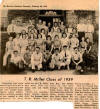
When
Jean Gillis (far right, second row from top) graduated from T. R.
Miller High School in 1939, the world was hurtling toward war.
While it was exciting to be graduating, for her it was Friday.
Her dream was to be a nurse, and for that she would have to
leave home.

Up until that point,
the extent of her travel had been bus trips
to Shocco Springs with her church group. The idea of
leaving home was exciting and scary.
Her
father, John Patrick Gillis, had been killed by logs that crashed into
his truck when the ropes broke on the log truck ahead of him when she was thirteen. Her
mother, Eunice, still had four younger children at home. Patricia, the
baby, was three months old at that time. So,
accompanied by her Sunday School teacher Miss Lydia Davidson, she paid
a visit to Mr. McMillan, the president of the local bank. There
she took out a loan so that she could quit her job at the dime store
and the book keeping she had been doing in order to attend nursing school at St.
Margaret’s hospital in Montgomery, Alabama. It took courage to sit
across the desk from the banker and ask him to trust her with the loan
for her education.
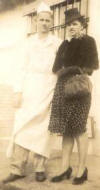
Her
brother worked at Stokes Meat Market. He’d saved up some money
from his work at the meat market and his paper route and bought her
suitcase. Her mother bought her a new outfit. She boarded
the bus in Brewton, Alabama. She cast a longing look behind her
as the Greyhound bus pulled away from the station. Fear and
anticipation set her heart pounding as she left all that was familiar
behind. But with determination, she directed her attention ahead
of her excitement rising in anticipation of what life had in store for
her. It was just Monday.
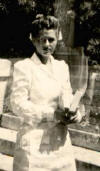
Jean
Gillis
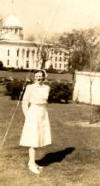
Roommate
While she was sequestered in the
security of South Alabama, playing pranks on her roommate from Atmore,
Alabama, and convincing the Sisters there wasn’t a serious bone in her
body, the world was rocked with the news from Europe and in the
Pacific. They were not immune from the goings on throughout the
world.
Much to the Sisters' surprise the
spirited young woman from Brewton scored the highest of anyone in the
state when she took the state board in nursing
 Jim
Gillis Jim
Gillis 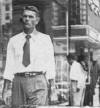
When Japan attacked Pearl Harbor and the United States entered the
War, young men from her home town began signing up. Her brother, James Patrick Gillis, enlisted in the Marines.
Those young men were going to serve their country.
John Patrick Gillis, WWI
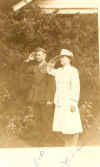 Jim and Jean salute
Jim and Jean salute
Her father, John Patrick Gillis,
had made the trip to France in the War that was meant to end all Wars,
World War I. That hadn't happened. Now, it seemed
inevitable.
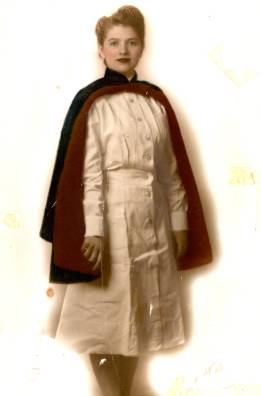 Someone
had to go and finish the job. And someone had to go and patch
those up who were injured in the process. It could
be her little brother lying injured on a battlefield far from home and
family. Those young men were going to serve their country.
Could she do less? So she when she graduated from St.
Margaret’s, Jean also enlisted. For her, it was just Tuesday. Someone
had to go and finish the job. And someone had to go and patch
those up who were injured in the process. It could
be her little brother lying injured on a battlefield far from home and
family. Those young men were going to serve their country.
Could she do less? So she when she graduated from St.
Margaret’s, Jean also enlisted. For her, it was just Tuesday.
Eunice Jernigan Gillis, Jean’s
widowed mother, had already sent her only son off to War. She
left the three younger girls at home to accompany Jean as far as she
could on the train. The two had always been very close.
Jean had shouldered as much of the responsibility for her family after
her father’s death as her young shoulders could bear. She often
said that she and her mother grew up together.
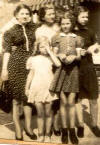 They
met a good looking Naval officer on the train who gave them a copy of
the July “The Mock-Up” upon which cover, the young officer’s
picture was featured. Eunice’s handwritten note on the cover
reads, “Jean was on way to Jackson, Miss., her first assignment when
she joined Army Nurses. I went as far as Gulfport with her.
Ensign Tyson was on the trip. He gave her copy of this magazine.
He was very nice.” They
met a good looking Naval officer on the train who gave them a copy of
the July “The Mock-Up” upon which cover, the young officer’s
picture was featured. Eunice’s handwritten note on the cover
reads, “Jean was on way to Jackson, Miss., her first assignment when
she joined Army Nurses. I went as far as Gulfport with her.
Ensign Tyson was on the trip. He gave her copy of this magazine.
He was very nice.”
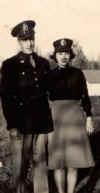 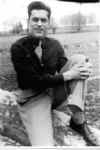 The
many pictures in her picture collection attest to her recollection
that picture taking was one of the favorite pursuits of young
Americans. Here she met Eddy Cooley whom she dated during her
sojourn in Jackson. The picture to the left is captioned, Cow
Pasture, March, 1943. The
many pictures in her picture collection attest to her recollection
that picture taking was one of the favorite pursuits of young
Americans. Here she met Eddy Cooley whom she dated during her
sojourn in Jackson. The picture to the left is captioned, Cow
Pasture, March, 1943.
 These
patients had already seen service and were recuperating at her first
assignment in Jackson, Mississippi. These
patients had already seen service and were recuperating at her first
assignment in Jackson, Mississippi.

The caption of this picture reads:
Sept. 2, 1944, Eve of Departure from Atlanta. Photographers at
clubs such as this would take pictures to sell to patrons. Then
they could all sign and write notes on the back of the pictures.
The notes on the back of this photograph read:
“Here’s to a swell girl and I
wish I had met her sooner. Lot’s of Luck I think lots of you
Jean Always Jim B.”
“Jean I wish we could have been
together if for no other reason than you’re a swell kid, a good sport
and a old towner. Here’s wishing you the best of luck.
Helen Rifter”
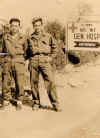 “Words
cannot express how much luck I wish to you. Remember what I said
about Blackie’s sox. Heaps of the best. Joe” “Words
cannot express how much luck I wish to you. Remember what I said
about Blackie’s sox. Heaps of the best. Joe”
From Atlanta they went to New York
where they boarded a troop ship bound for Cherbourg, France, where she
would join the 164th General Hospital for detached service
with hospital trains then sent to bring soldiers wounded at the Battle
of the Bulge back from the front. When a soldier was injured he
was taken to a field station where they performed triage. They
were then transferred to the hospital train and taken to Cherbourg to
board a hospital ship to be transported to a hospital away from the
field of battle. She earned a battle ribbon for this service.
 This
was the 165th General Hospital station set up outside
Cherbourg. This
was the 165th General Hospital station set up outside
Cherbourg.
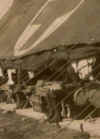
One of her occupations was writing
letters home for patients.

It was cold…so cold they wore
everything they owned layered so thick that the call to the “loo” was
a time consuming, sometimes anxious, experience.
 There
occasionally was time to see the sights. Cherbourg was a
beautiful city with warm and friendly people. Americans enjoyed
the town life. There
occasionally was time to see the sights. Cherbourg was a
beautiful city with warm and friendly people. Americans enjoyed
the town life.

There was quite a different dress
code for going into the city and for everyday frontline activities.
This group of nurses grew quite close during their time together.
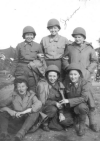
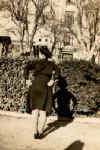 Although
she requested that this picture be eliminated, as her daughter who
loves her, I felt it only showed another side of a fun loving young
woman. Although
she requested that this picture be eliminated, as her daughter who
loves her, I felt it only showed another side of a fun loving young
woman.

These eggs have significance.
They were rare. The hospital train stopped briefly
as its engineers were constantly doing to chat with those beside the
rail, Jean spied a farmer beside the tracks selling eggs. It
had been so long since she’d had any eggs, she decided to jump down,
buy the eggs and then hop back on. As her luck would have it,
the engineer completed his conversation just as she was purchasing the
eggs and the train began to roll off. Putting the eggs in her
cap and gingerly clasping the precious commodity to her chest, she
hurried back to the train which continued to pick up speed. Her
friend stood on the back of the train and taunted her as she jogged
breathlessly beside the train. “Share the eggs and I’ll stop the
train,” he repeated over and over. She finally realized he meant
it and agreed. Eggs, something she’d taken for granted in
Brewton, Alabama, had gained new meaning.

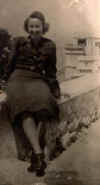 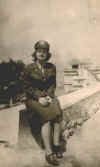
June 6, 1945, Marseilles
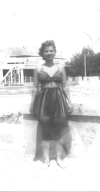 Finally,
the War was over and they had time for some R and R before returning
home. So, Jean and her friends did the Riviera. Finally,
the War was over and they had time for some R and R before returning
home. So, Jean and her friends did the Riviera.
|
 They
saw the sights in Paris. They
saw the sights in Paris.

Visited with other Americans
in some of the night clubs.
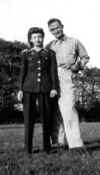 Penny,
a fellow nurse and friend in France, actually wound up settling in
Dothan, Alabama and had a child Jean’s daughter's age. (That
was me! Penny's daughter, Debbie, became one of my best friends!) They
rediscovered each other in Mrs. Camp’s first grade classroom in
Dothan, Alabama, as room mothers years later. Penny,
a fellow nurse and friend in France, actually wound up settling in
Dothan, Alabama and had a child Jean’s daughter's age. (That
was me! Penny's daughter, Debbie, became one of my best friends!) They
rediscovered each other in Mrs. Camp’s first grade classroom in
Dothan, Alabama, as room mothers years later.
 Finally
they were headed home. Here they are aboard the ship headed
home. Finally
they were headed home. Here they are aboard the ship headed
home.
Jean
settled in at Augusta General Hospital in Augusta, Georgia, where
she met Dr. Elkanah George Burson from Furman, Alabama.
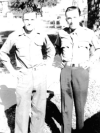
Captain E. G. Burson
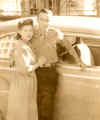
Jean and George
If the camera
disappeared from the glove compartment of this car, he knew he was
in trouble. I'm glad they took all those pictures.

They married August 3, 1947.
It was Sunday.
This is her
story. As her daughter I am impressed with the courage it
took to leave home and go to war. Mother saw it as just
another day.
But, the war story she told her children and grandchildren went
like this. (Sharman's version of her mother's bedtime story)
|
|